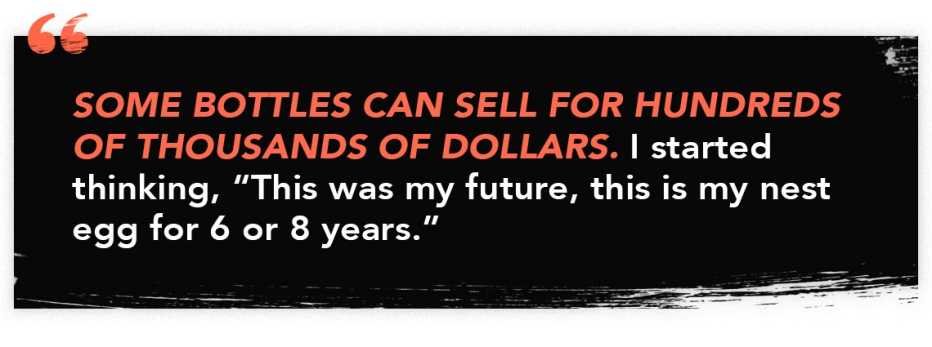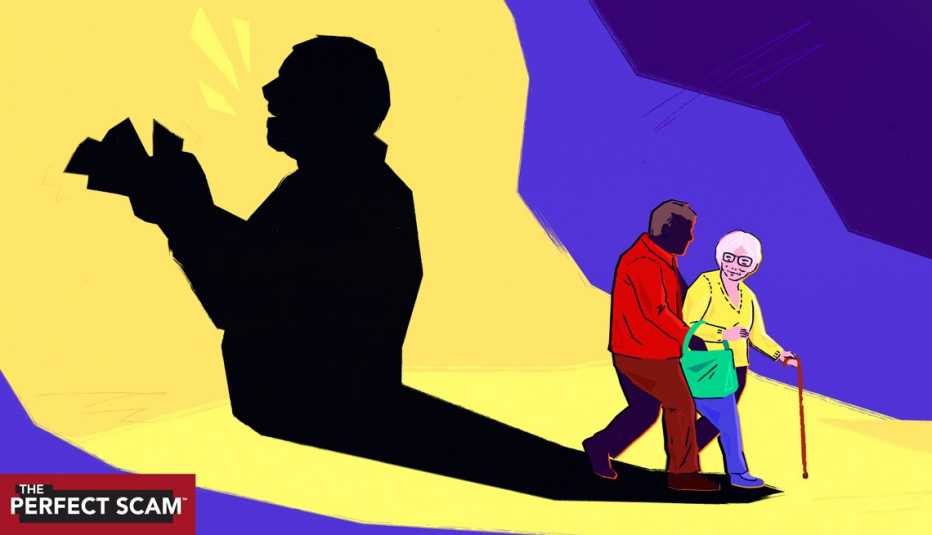He meets with a wealth manager, Casey Alexander, who is well-mannered and professional.
[00:00:04] Ray Stiefel: You own, you own the barrels.
Some bottles can sell for hundreds of thousands of dollars you know if it’s the right bottle.
[00:00:27] Bob: Do you remember how you felt when you bought the whiskey?
(MUSIC SEGUE)
[00:00:43] Bob: Welcome back to The Perfect Scam.
I’m your host, Bob Sullivan.

After all, whiskey often increases in value over time.
Now all investing carries risks, but these kinds of non-traditional investments really do come with some extra hazards.
[00:01:46] I, I remain just moderate level drinker.

I’m still learning to appreciate the variety of whiskey.
It’s just very interesting.
[00:02:28] Bob: And an ounce of whiskey is hours of stories, right?

[00:02:31] Ray Stiefel: Yes, it really is.
There are something in the neighborhood of 120, 130 separate distilleries in Scotland.
There’s the, the Islands, which includes Ila, which is a, a big producing area.
So I think those are the five main ones.
So it’s a three-year process just to get the label of whiskey.
But there’s all these little bits of trivia that I find fascinating.
[00:03:26] Bob: Ray’s not the only one.
[00:03:43] Ray Stiefel: True, very true.
The real estate and the buildings, they’re still there.
[00:04:01] Bob: And as with all growing industries, there is an ever-present need for investors.
You’re, you’re in it for the long haul, right?
[00:04:39] Ray Stiefel: Definitely, yes, yes.
The uh, in the industry they call it your exit strategy.
And that is the, the distilleries permission, well you own, you own the barrels.
[00:05:29] Bob: …
I mean I suppose if you want to, you could go visit your barrel, right?
[00:05:33] Ray Stiefel: Yes, and taste it.
[00:05:35] Bob: And taste it, remarkable.
But is this a thing regular people really do?
[00:06:07] Ray Stiefel: I would say the average price is probably around $5000.
[00:06:44] Bob: And it’s $50 a bottle, that’s $12,500.
[00:06:49] Ray Stiefel: Yes.
[00:06:49] Bob: And you paid $5000, and that’s in three years.
[00:06:57] Ray Stiefel: Yeah.
It might be more.
I mean wines improve over age and some wines don’t.
But you’re correct.
[00:07:16] Ray Stiefel: Yes.
And some bottles can sell for hundreds of thousands of dollars you know if it’s the right bottle.
[00:07:25] Bob: That’s amazing.
[00:07:25] Ray Stiefel: Yeah.
[00:07:27] Bob: Okay, so how does a person go about buying a barrel of whiskey?
[00:07:34] Ray Stiefel: Typically you don’t buy barrels directly from the distillery.
[00:07:57] Bob: Building a house?
Now you’re going to have to explain that.
[00:07:59] Bob: Ray was building a house.
I told you he’s a bad retired person.
During the tail end of COVID which he planned to sell with a friend.
That’s another investment.
I was the, the primary financier.
[00:08:41] Bob: Wow.
So this was a house that you built and sold?
[00:08:44] Ray Stiefel: Yes.
[00:08:45] Bob: Wow.
And I had been investing in the stock market.
And that was all, never commodities, always in the stock market.
He has an accent?
[00:09;13] Ray Stiefel: Yes, he did.
He had a British accent.
[00:09:15] Bob: Did he seem well-spoken?
Did he seem young, old?
[00:09:18] Ray Stiefel: He seemed uh maybe in his 30s, and well-spoken, well-educated.
And well-versed in, in uh, investing in barrels of whiskey.
[00:09:29] Bob: So how long did you talk to him?
[00:09:31] Ray Stiefel: Probably half an hour.
[00:09:33] Bob: And where did you leave it at the end of that first phone call?
[00:09:53] Bob: Do you remember anything about the sound of his voice?
[00:09:56] Ray Stiefel: I couldn’t quite place whether he was Irish or English.
So he definitely had a, an accent from that part of the world.
[00:10:08] Bob: Um, sure.
Also seemed in his 30s or something like that?
[00:10:11] Ray Stiefel: Yes.
[00:10:13] Bob: And, and also very well-versed in the whiskey business?
[00:10:17] Ray Stiefel: Absolutely.
Yeah, very professional.
[00:10:34] Ray Stiefel: Very little, very little.
I was not at all familiar with all the different brands and labels and types of whiskey.
My grandparents were Irish.
Well, more like take a sip.
He buys six barrels of whiskey which is basically the minimum.
[00:11:08] Ray Stiefel: He sent me an invoice for my first purchase.
[00:11:20] Bob: Okay.
[00:11:28] Ray Stiefel: Yes.
[00:11;29] Bob: Do you remember how you felt when you bought the whiskey?
[00:11:51] Bob: Double the money in six or eight years.
You know that’s hardly an outrageous estimate.
An investment that grows 10% every year, doubles every seven years.
And by the way, an investment the grows 7% doubles every 10 years.
It’s what’s known as the 7-10 rule in investing.
It’s just math.
That seems kind of fun.
[00:12:27] Ray Stiefel: Yes, yeah.
[00:12:43] Bob: Okay, that’s getting ahead of ourselves.
[00:13:21] Bob: Diversify even more, Casey recommends.
you could buy whiskey in a similar way.
So there’s, you know, a lot of variety.
And he would just offer me different options to diversify my investments.
[00:14:13] Bob: So each month for several months Ray buys another set of barrels.
Pretty soon his whiskey tasting investment has swelled into six figures.
And along the way, he can meet his new friend and fellow whiskey enthusiast, Casey Alexander.
And he said, sure.
So I, I flew into London.
The car brought me to a nice restaurant in London where I met Casey.
We had a nice meal together.
He was very professional, very well-dressed, very well-spoken.
He was, I’m about 6'3".
He was probably 5'11".
Well he had a well-trimmed beard.
He was really, you know he presented really well.
Every time I saw him, he was wearing a suit.
[00:15:36] Bob: I mean was he funny?
Did you have a good chat?
[00:15:38] Ray Stiefel: We did, yeah, we did.
Yeah, it was very personable, it was very personal.
[00:15:50] Bob: He felt like a friend at this point?
[00:15:51] Ray Stiefel: Yes.
And then his driver took me back to the airport for my ongoing flight.
[00:16:21] Ray Stiefel: No.
Um, there was one called Tullibardine, Tullibardine, which is a whiskey quite near Glascow.
And I drove by it, but it said, “Not Open to the Public.”
So no, we never visited any of my barrels.
[00:16:56] Bob: Ray owns these barrels, but he cannot visit them.
So naturally he plans another trip a few months later, and that’s even more fun.
In part because he gets to spend much more time with Casey.
[00:17:10] Ray Stiefel: And the second time I met Casey, very fancy restaurant.
We just spent the day together.
We went to two or three distilleries.
[00:18:28] Bob: So he certainly sounded like he was in the business.
[00:18:30] Ray Stiefel: Yes.
And from which he got, he claimed he got a certificate.
But he sent me pictures.
I think he actually went to this seminar.
And he sent me a picture of him at this seminar.
That, so I think that was valid.
He’s a part of it.
[00:19:10] (video clip) Come in here and watch what I do.
It really just reaffirms my love affair with whiskey.
So you know today I just feel extremely inspired by this whole process, this whole business.
The beauty of everything involved.
[00:19:57] Ray Stiefel: Probably, probably, I’m going to say 15.
[00:20:02] Bob: And were they all in the $20,000 range or so?
[00:20:06] Ray Stiefel: Yes.
Because typically you buy in a lot, and a lot is six barrels.
[00:20;14] Bob: Ah, okay.
So they will sell them in lots of six barrels.
There was no food involved.
There was whiskey tasting involved, but there was no, there was no food involved.
So I felt very solid about that.
[00:21:31] Bob: But suddenly, not so solid about Casey.
[00:22:06] Bob: And what is your territory?
We have offices in Cleveland, Akron, Youngstown, and Toledo.
One catches Brian’s eye.
It sounds way too familiar.
[00:23:07] Bob: It was a remake.
[00:23:08] Brian McDonough: It was a remake.
[00:23:10] Bob: Oh my God.
[00:23:36] Bob: Oh wow.
[00:23:36] Brian McDonough: Outside of London.
And there was an opportunity to purchase this champagne.
[00:24:40] Bob: And many of the complaints named the same salesman.
Casey Alexander and everyone else seemingly involved in this scam is in the UK.
They can’t go arrest them there.
So they devise a plan to bring Casey to the US.
There is a reason why Brian dropped mention of the movie, The Sting, earlier.
So Casey came over and met in person with various uh investors.
But the FBI doesn’t arrest Casey right as he gets off the plane.
His name was on the bank accounts, he was the face of this investment opportunity.
If investors went to a website, they saw him on the, on the website.
So the ability to uh take him down was very gratifying.
[00:27:23] Bob: Was he surprised?
Was he, you know, resistant?
Or how did it go?
[00:27:57] Bob: Okay, so they brought him into your offices.
[00:27:59] Ray Stiefel: Correct.
[00:28:24] Brian McDonough: Tall, thin, uh good-looking, uh had a British accent.
Was respectful, courteous, was uh intelligent and spoke very well.
[00:28:40] Brian McDonough: Uh, it’s a mixture.
Uh, one is to get justice for victims, and that means just stopping the fraud itself.
How did they end up on this path?
He was not the only one.
He was not the mastermind of the operation.
But that he admitted uh what he did was wrong.
It wasn’t a highly regulated uh industry.
It’s local news and Ray spots the story.
“Young whiskey scammer steals $13 million from investors,” something like that.
[00:30:16] Bob: And who was the young whiskey scammer?
[00:30:18] Ray Stiefel: Casey.
[00:30:20] Bob: It’s the Casey you knew.
[00:30:20] Ray Stiefel: Yeah.
[00:30:22] Bob: Was there a picture of him in the story?
[00:30:23] Ray Stiefel: I’m going to say no, but it had to be him.
[00:30:27] Bob: You knew it had to be him.
What did that feel like?
[00:30:29] Ray Stiefel: Like a punch to the stomach.
[00:30:32] Bob: God, it’s terrible.
I mean you must have had some reaction like there’s got to be some mistake, right?
[00:30:36] Ray Stiefel: Yep.
No, we don’t have any barrels with those numbers."
But I pretty quickly confirmed that all of it was a scam.
[00:31:35] Bob: God, that just terrible.
[00:31:38] Ray Stiefel: Yeah.
[00:31:39] Bob: Did you venture to reach out to Casey?
[00:31:41] Ray Stiefel: Yes, I did.
And initially the uh, the company remained reachable by phone in London.
And he was always, you know, too busy or not available.
So very quickly I could not reach anybody.
They still had people in the office.
So what does a person do in that situation?
[00:32:37] Ray Stiefel: What did I do.
At some point I called Brian McDonough, he’s, he’s very supportive.
He did say, “Don’t expect to get any of your money back.”
[00:32:47] Bob: How did you find him?
[00:32:49] Ray Stiefel: Let me think.
I, he, he might have been named in one of the articles.
[00:32:53] Bob: Okay, got it, yeah.
[00:33:04] Bob: So what kind of complexities did that create for the case?
[00:33:07] Brian McDonough: For the case it was a little challenging because of the federal system.
So he remained in the Northern District of Ohio during the pendency of his case.
Ray had a uh, I would say a, a unique connection.
He spent a lot of time talking with, with Casey.
And that’s where you’ll find the surprise ending I’ve promised you.
[00:34:32] Bob: So you know it, yeah.
I hadn’t seen him except for that, those two times.
And he didn’t make eye contact with me.
He walked right to the, the, the uh defendant table.
The defendants were on one side and the uh district attorney, the prosecutors were on another side.
[00:35:09] Ray Stiefel: And everybody seemed fine.
And that was myself.
So I got to stand up at a little microphone and I told the judge and others my experience.
There wasn’t a jury because he was already guilty, he already claimed to be guilty.
I just said how it affected me, my finances.
So I made a couple of remarks.
I spoke for a couple minutes about my experience as a victim of this scam.
And then something remarkable happens.
And he reached out.
Even though I’m not 100% sure at what point he knew it was a scam.
I don’t know.
And he said, “I’m really sorry, I didn’t know this was happening.”
And then he walked away.
[00:37:07] Bob: Wow.
[00:37:08] Ray Stiefel: Yeah.
[00:37:17] Ray Stiefel: He uh, and I, I received it.
I didn’t push him away, I didn’t hit him in the head.
And the people he was representing had other intentions.
He was unaware that there were no barrels.
[00:37:59] Ray Stiefel: Yes, that’s, that’s a possibility.
[00:38:01] Bob: Brian is bowled over by the hug exchange between victim and criminal.
[00:38:08] Brian McDonough: Ray was mer-, very merciful.
He had forgiven Casey uh for Casey’s conduct, and that is, that is rare.
[00:39:10] Brian McDonough: He really did.
Is this, is this someone who’s exploiting someone for their own gain?
[00:40:49] Bob: You are saying such a mouthful here.
Close that chapter and allow yourself the ability to move on.
[00:41:21] Bob: Brian’s got a lot of wisdom when it comes to scams.
And that there is an external locus of control.
[00:42:26] Bob: It’s so interesting the way you put that, however.
[00:42:44] Brian McDonough: Yes.
[00:44:59] Bob: Sometimes it’s hard to know where to report the crime to.
You, you mentioned state securities regulators for example.
Have there been complaints about this broker?
What are the risks that are involved?
[00:46:16] Bob: Ray is trying to move on with his life.
[00:46:29] Bob: He’s now free in the UK, right?
[00:46:31] Ray Stiefel: I believe so.
But if there are any international agreements that felons are free, but they had to make compensation.
And Brian said no.
I don’t know, I’m going to call him again because he’s very approachable.
He’s that kind of guy.
[00:47:05] Bob: The pain he feels from the crime lives on as does the impact.
[00:47:12] Ray Stiefel: The immediate emotion is fear.
Not for my own uh physical well-being but for my financial well-being.
I do a lot of international, domestic and international welfare.
So the biggest thing, my biggest concern, ‘cause I’ll, I’m fine.
You know I wasn’t planning on buying a yacht.
World Central Kitchen is the…
[00:47:57] Bob: You mean Jose Andres’ thing, right?
[00:48:19] Bob: Ah, that’s just a terrible thing.
[00:48:27] Ray Stiefel: Yep, yeah.
It would probably cost lives.
[00:48:40] Bob: Wow.
I like to give away, and it just, I mean there’s less to give away.
[00:48:56] Bob: And he’s left feeling more distrustful than ever.
Visit, do as many visits as you could.
I mean there are all kinds of investments.
Um, this one is not regulated by the US government.
You know if they’re making something, go to the factory.
[00:50:25] Bob: Sure.
There’s something called a delivery order.
[00:51:32] Bob: Sounds kind of like a car title.
[00:51:33] Ray Stiefel: Yes, yep.
Most people should just stick to straightforward investments like those available like a 401k or a IRA.
[00:52:39] Ray Stiefel: Yes.
That’s the best, simplest advice.
For The Perfect Scam, I’m Bob Sullivan.
Call the AARP Fraud Watch online grid Helpline at 877-908-3360.
Their trained fraud specialists can provide you with free support and guidance on what to do next.
That address again is: theperfectscampodcast@aarp.org.
Be sure to find us on Apple Podcasts, Spotify, or wherever you listen to podcasts.
For AARP’s The Perfect Scam, I’m Bob Sullivan.
